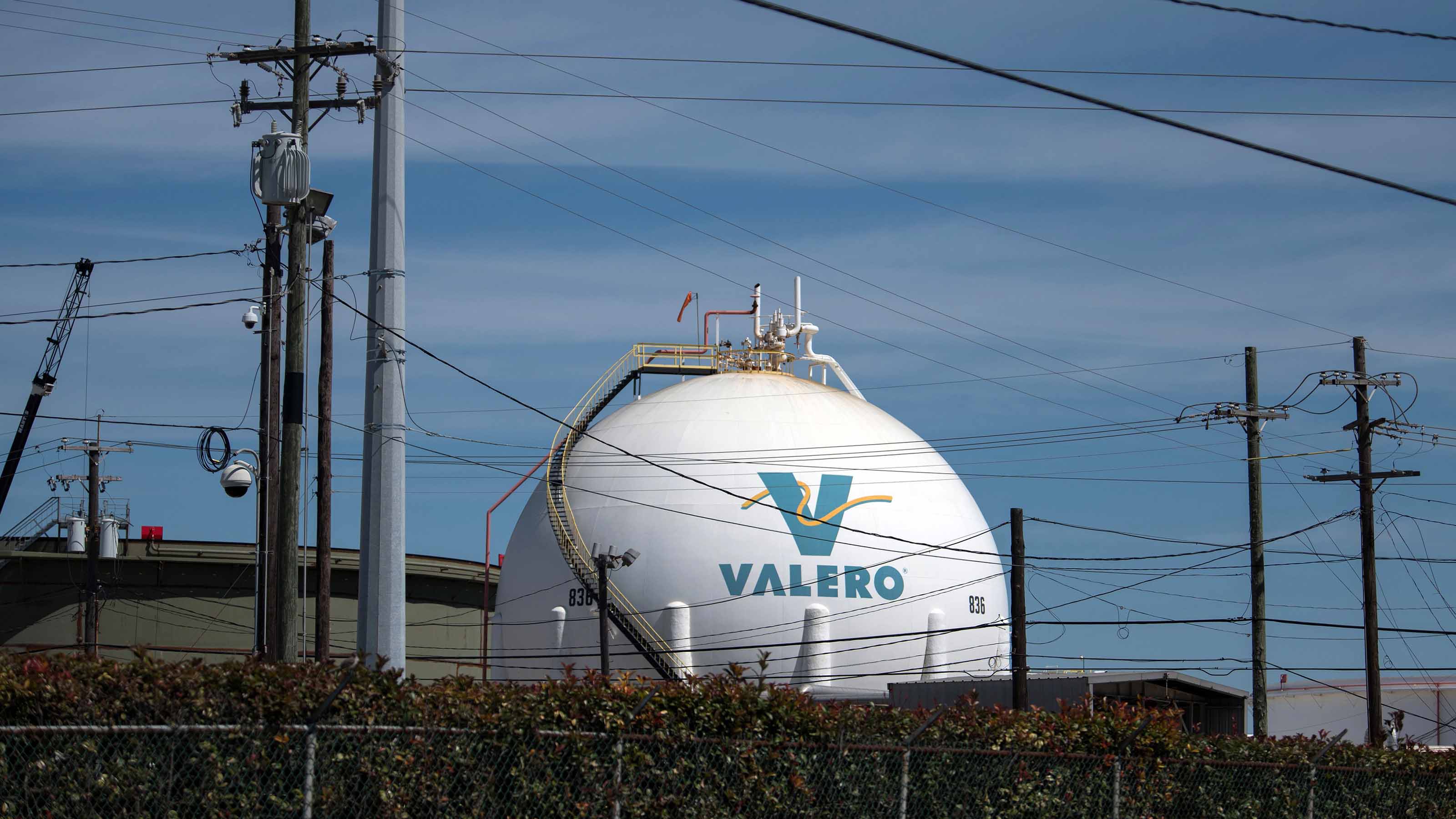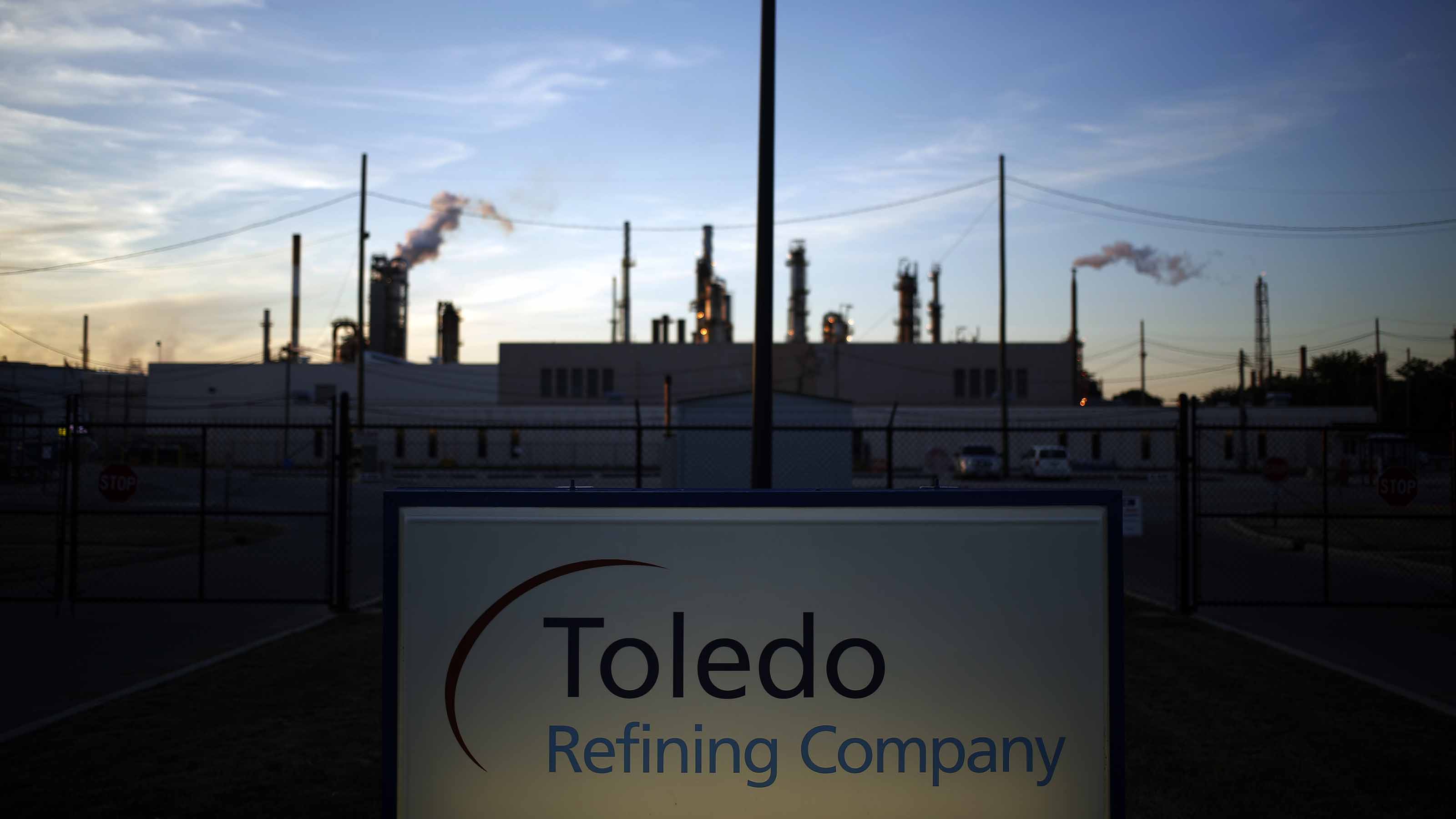3 Red-Hot Refining Stocks for Surging Gas Prices
Gas prices have spiked to their highest level in over a decade, which could create more upside for these three refining stocks.

Profit and prosper with the best of Kiplinger's advice on investing, taxes, retirement, personal finance and much more. Delivered daily. Enter your email in the box and click Sign Me Up.
You are now subscribed
Your newsletter sign-up was successful
Want to add more newsletters?

Delivered daily
Kiplinger Today
Profit and prosper with the best of Kiplinger's advice on investing, taxes, retirement, personal finance and much more delivered daily. Smart money moves start here.

Sent five days a week
Kiplinger A Step Ahead
Get practical help to make better financial decisions in your everyday life, from spending to savings on top deals.

Delivered daily
Kiplinger Closing Bell
Get today's biggest financial and investing headlines delivered to your inbox every day the U.S. stock market is open.

Sent twice a week
Kiplinger Adviser Intel
Financial pros across the country share best practices and fresh tactics to preserve and grow your wealth.

Delivered weekly
Kiplinger Tax Tips
Trim your federal and state tax bills with practical tax-planning and tax-cutting strategies.

Sent twice a week
Kiplinger Retirement Tips
Your twice-a-week guide to planning and enjoying a financially secure and richly rewarding retirement

Sent bimonthly.
Kiplinger Adviser Angle
Insights for advisers, wealth managers and other financial professionals.

Sent twice a week
Kiplinger Investing Weekly
Your twice-a-week roundup of promising stocks, funds, companies and industries you should consider, ones you should avoid, and why.

Sent weekly for six weeks
Kiplinger Invest for Retirement
Your step-by-step six-part series on how to invest for retirement, from devising a successful strategy to exactly which investments to choose.
If you've recently filled up your tank, you may have noticed that your wallet feels a bit lighter. That's because gasoline prices have surged to a decade-plus high of $4.25 per gallon according to AAA amid a host of factors, the largest of which include the crisis in Ukraine and supply-demand imbalances.
But while skyrocketing gas prices are hurting consumers, they're creating a boon for the energy sector – including refining stocks.
Refiners take raw crude oil and natural gas, send it through a chemical process and turn it into products we can actually use. This includes gasoline, jet fuel and diesel. The secret to the refiner's operational success is called the "crack spread," which measures the difference between the value of gasoline and crude oil – and is used to approximate a company's potential profit margin.
When crack spreads are wide, refiners profit more. And right now, crack spreads are agape. According to the latest Energy Information Administration (EIA) report, the average RBOB-Brent crack spread – a widely used measure – jumped 67% between Feb. 28 and March 3, and is well above the average for this time of year.
In plain English, these could be sunny days for the major refining stocks – especially if more countries join the U.S. in banning Russian oil. Overall, these booming crack spreads should result in better earnings for refiners down the pike. And given the propensity for energy stocks to share those earnings through dividends and buybacks, investors could profit handsomely as well.
Here are three refining stocks to benefit from surging gas prices. Each of the names featured here served up solid results to end 2021 – and could continue to deliver as oil prices keep rising.
Data is as of March 8. Dividend yields are calculated by annualizing the most recent payout and dividing by the share price.

Valero
- Market value: $37.1 billion
- Dividend yield: 4.3%
When it comes to refining stocks, no one is bigger than Valero (VLO, $90.54). With 15 refineries in the U.S. and Canada, Texas-based VLO is the largest independent refiner in the world.
Moreover, Valero is the second-largest producer of renewable fuels like ethanol and biodiesel. This massive size and scope combined with the variety of refined products under its umbrella has suited the stock well throughout its history. Within this large system, VLO is able to extract every margin of profit out of crack spreads and each barrel of crude that travels through its facilities.
"The company's disciplined strategy in recent years has positioned VLO at the forefront of top-tier refining operations, while the footprint in both renewable diesel and now carbon capture is well ahead of the energy industry," says Raymond James analyst Justin Jenkins (Strong Buy).
You can see this in the company's latest earnings report. Thanks to rising fuel demand and better crack spreads, revenues at VLO surged 116% year-over-year to $35.9 billion in the fourth quarter of 2021. Meanwhile, adjusted earnings arrived at $2.47 per share compared to a per-share loss of 88 cents in the year-ago period.
These top- and bottom-line results are impressive for sure, but where the increasing crack spreads and earnings growth can really be felt is in Valero's cash flows. Thanks to relatively stable fixed costs for downstream sectors, refining stocks tend to throw off plenty of cash flows.
VLO, for instance, was able to reap $5.9 billion in net cash from its operating activities in fiscal 2021. With such hefty cash flows, Valero has quickly become a shareholder-rewards champion, sending $1.6 billion of that cash back to shareholders through dividends. Over the last decade, VLO has grown its dividend 20.7%, on average, annually. The firm has also been prudent in using that excess cash to reduce its debts.
In the end, when it comes to refining stocks, Valero's huge footprint and wide moat make it a top name in the sector. And as an added bonus, VLO sports a healthy dividend yield of 4.65% and below-market forward price-to-earnings (P/E) ratio of 13.5x (the forward P/E for the S&P 500 is 19.2x).

Phillips 66
- Market value: $37.0 billion
- Dividend yield: 4.4%
Phillips 66's (PSX, $84.31) strategic focus in the downstream industry makes it one of the best refining stocks as well.
Yes, Phillips refines crude oil into gasoline, diesel and jet fuel through its 12 refineries. It also sells that gasoline and other products at its more than 8,800 independently owned outlets. This allows it to profit from the improving crack spreads and overall fuel demand.
Last quarter, PSX's refining segment managed to realize pre-tax income of $346 million. This compared to a pre-tax loss of $1.1 billion in the third quarter. Clearly, the increase in spreads and overall demand is working wonders for the company's bottom line.
Another win for Phillips 66 is that it is a petrochemicals giant.
Thanks to its joint venture with Chevron (CVX), Phillips is a major producer of high-density polyethylene (HDPE) plastic, polypropylene plastic and various other chemicals. Like gasoline, petrochemicals can come with various spreads that determine prices – and typically, margins on these products are high to begin with. There's more value-add for the chemical crackers.
As the economy moves toward the endemic phase of the COVID-19 crisis and growth has returned, demand for plastic and other chemicals is surging. For all of 2021, PSX managed to report record earnings in its chemicals segment.
For shareholders, the strong performance across its various divisions has made PSX a reward powerhouse. With its $6.0 billion worth of operating cash flow, Phillips managed to reinvest in its business, pay down debt and increase its quarterly dividend by 2.2% to 92 cents per share. This continues PSX's long streak of making shareholders happy.
Going forward, there's plenty of growth to be had for the firm. In addition to rising demand and better spreads for chemicals and gasoline, PSX should see increased synergies and earnings related to its buyout of its master limited partnership (MLP) subsidiary Phillips 66 Partners (PSXP).
In the here and now, PSX stock is one of the cheapest refining stocks out there, with a forward P/E ratio of 11x. At the same time, its yield is a market-beating 4.4%. Phillips 66 is a different piece of the refining puzzle, but is well worth a closer look.

PBF Energy
- Market value: $2.8 billion
- Dividend yield: N/A
When you stop by a Mobil service station, you know you're getting gasoline produced by Exxon Mobil (XOM). However, there are plenty of convenience stores and other fuel stops that are part of larger chains. We're talking about your Casey's (CASY), Sheetz, Wawa's, Love's Travel Stops, etc. of the world. These stores don't own downstream refining assets and the gasoline they sell is often unbranded, meaning it is fuel sold without a brand name attached to it. And in many instances, that gasoline comes from refiner PBF Energy (PBF, $23.54).
PBF was formed back in 2008 as a joint venture between European refiner Petroplus and private equity group BlackStone (BX). The pair purchased a series of small independent refineries across the U.S., cobbled them together and created PBF.
Since its creation, PBF has grown by roughly double. Today, the firm owns and operates six domestic oil refineries, with throughput of over 1,000,000 barrels per day. With PBF being one of the largest producers of non-branded gasoline, it is in a position to play the growth in demand from other service stations.
True, demand at these third-party stations declined during the early days of the pandemic and PBF was hit pretty hard. Because of its smaller size, the firm was forced to suspend its dividend and go into cash-preservation mode. The firm even divested some assets to raise cash.
More recently, PBF has shown signs of strength. For starters, the stock is up nearly 40% in the last 12 months. Plus, the company managed to end 2021 with nearly $1.3 billion in cash on its balance sheet. And income from operations for the full fiscal year came in at $597.2 million – a notable improvement over the $1.4-billion loss PBF incurred for all of 2020. If results continue to improve, investors may see the dividend reinstated as well.
While PBF is riskier than the other refining stocks on this list, it does represent a higher-growth opportunity and the potential for a big turnaround.
Profit and prosper with the best of Kiplinger's advice on investing, taxes, retirement, personal finance and much more. Delivered daily. Enter your email in the box and click Sign Me Up.
-
 The New Reality for Entertainment
The New Reality for EntertainmentThe Kiplinger Letter The entertainment industry is shifting as movie and TV companies face fierce competition, fight for attention and cope with artificial intelligence.
-
 Stocks Sink With Alphabet, Bitcoin: Stock Market Today
Stocks Sink With Alphabet, Bitcoin: Stock Market TodayA dismal round of jobs data did little to lift sentiment on Thursday.
-
 Betting on Super Bowl 2026? New IRS Tax Changes Could Cost You
Betting on Super Bowl 2026? New IRS Tax Changes Could Cost YouTaxable Income When Super Bowl LX hype fades, some fans may be surprised to learn that sports betting tax rules have shifted.
-
 Dow, S&P 500 Rise to New Closing Highs: Stock Market Today
Dow, S&P 500 Rise to New Closing Highs: Stock Market TodayWill President Donald Trump match his Monroe Doctrine gambit with a new Marshall Plan for Venezuela?
-
 'Donroe Doctrine' Pumps Dow 594 Points: Stock Market Today
'Donroe Doctrine' Pumps Dow 594 Points: Stock Market TodayThe S&P 500 rallied but failed to turn the "Santa Claus Rally" indicator positive for 2026.
-
 Stocks Chop as the Unemployment Rate Jumps: Stock Market Today
Stocks Chop as the Unemployment Rate Jumps: Stock Market TodayNovember job growth was stronger than expected, but sharp losses in October and a rising unemployment rate are worrying market participants.
-
 The 24 Cheapest Places To Retire in the US
The 24 Cheapest Places To Retire in the USWhen you're trying to balance a fixed income with an enjoyable retirement, the cost of living is a crucial factor to consider. Is your city the best?
-
 Stock Market Today: Stocks Rise With Inflation Data on Deck
Stock Market Today: Stocks Rise With Inflation Data on DeckThe main benchmarks eked out modest gains to end the week as investors look ahead to next week's August CPI report.
-
 5 Stocks to Sell or Avoid Now
5 Stocks to Sell or Avoid Nowstocks to sell In a difficult market like this, weak positions can get even weaker. Wall Street analysts believe these five stocks should be near the front of your sell list.
-
 Best Stocks for Rising Interest Rates
Best Stocks for Rising Interest Ratesstocks The Federal Reserve has been aggressive in its rate hiking, and there's a chance it's not done yet. Here are eight of the best stocks for rising interest rates.
-
 The Five Safest Vanguard Funds to Own in a Volatile Market
The Five Safest Vanguard Funds to Own in a Volatile Marketrecession The safest Vanguard funds can help prepare investors for market tumult but without high fees.
